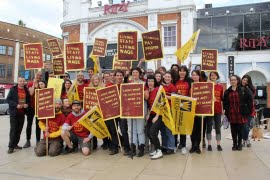Capitalism’s deepest crises will not only spur those professions with well-established labour movement connections into action, but will also have a similar effect on other layers of the working class. For almost a year, members of the BECTU union at the Ritzy Cinema in Brixton have been engaged in a campaign to be granted the London living wage rate of pay.
Capitalism’s deepest crises will not only spur those professions with well-established labour movement connections into action, but will also have a similar effect on other layers of the working class. For almost a year, members of the BECTU union at the Ritzy Cinema in Brixton have been engaged in a campaign to be granted the London living wage of £8.80 per hour, a rate calculated annually to reflect the basic living costs of a London resident.
Picturehouse Cinemas, which is owned by multiplex giant Cineworld, has so far refused this demand, despite posting revenues of over £400 million, all the while cultivating a ‘progressive’ image as Britain’s most successful art-house cinema. Any offers made by management have consistently fallen short of meeting BECTU’s demands, while the use of heavy metal barricades and a large (and doubtless expensive) security presence has demonstrated a determination to resist granting any significant ground to workers.
Like many areas of London, Brixton has seen gentrification and soaring property prices, significantly impacting the living costs of working class residents. This has no doubt contributed to the large amount of support and sympathy directed at the on-going campaign, with many viewing the case of the Ritzy as being yet another example of the unjustifiable hypocrisy of ever-increasing gains for the rich in the face of continuing cuts to workers’ standard of living.
A year after starting the struggle, which included strike action by staff at the Ritzy, BECTU members there have now accepted a new deal to increase their pay by installments in what amounts to a 26% rise over three years. This should mean that they achieve the living wage level by next September.
The majority of workers at the Ritzy, and in other similar entertainment venues, are young workers, and their involvement with BECTU and the living wage campaign is their first experience of organisation and trade unionism. Such young workers have been brought into the labour movement by the pressures that capitalism puts on ordinary people, particularly at a time of deep crisis. Along with the recent example of the strikes by fast-food workers in the USA, this demonstrates the huge potential that exists for organising workers in the more unorganised and precarious layers of the working class.
The workers at the Ritzy will continue their fight to get the bosses to formally include the living wage status in their collective agreements. Meanwhile members of the campaign have called on other service sector and low-wage workers to join the fight for an end to poverty pay in Britain, including those across the entertainment industry.






